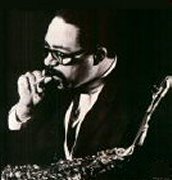|
Bold-toned tenor saxophonist Ervin (1930-1970) played for Charles Mingus and also made several albums under his own name. The Freedom Book Dec. 1963 / Prestige This album reminds me of some of Jackie McLean’s Blue Note dates, where an impassioned bop and blues based saxophonist (who sometimes blows off pitch) explores new pastures but doesn’t abandon swing and chord changes. The rhythm section of Jaki Byard, Richard Davis, and Alan Dawson does some notable work here, and Ervin wails up a storm, starting with the modal “A Lunar Tune”. Ervin’s powerful tenor mixes microtonal cries, twisted motifs, and altered bop runs into a riveting solo that seems constantly in flux. This tune also has solos from Byard (mostly modern ideas, none of that old-timey stuff) and Davis, whose bass is so well recorded you can hear every pluck clear as day. Dawson’s lickety-split precision is impressive, and he sometimes shifts suddenly from a ride cymbal to tom-tom riffs and so forth. (Rather like his student Tony Williams, in fact.) After “A Lunar Tune” comes “Cry Me Not”, a ballad that doesn’t sit very well in my ear due to Ervin’s off-key fluctuations. Horn players often lean sharp or flat for expressive purposes, but there’s a point where you’re just out of tune. I’m also not fond of Ervin’s tendency to let notes trail downward, which can sound crude in a tune such as this. “Grant’s Stand” is the most direct and exciting track, a blues in a pointy coat of armor that charges hard and gets a heated solo from Ervin. “A Day to Mourn”, recorded just a couple of weeks after Oswald’s crime, is a reflective elegy occasionally brightened by more affirmative patches. “Al’s In” begins in a dramatic way - almost like Coltrane’s “Drum Thing”, with the ritualistic mallets and bassline - and after picking up steam it turns to a lengthy Dawson solo. The Prestige RVG bonus track “Stella By Starlight” (originally released on a different LP, but recorded with the rest of the Freedom Book tracks) is perky and brief, although I’m again wary of Ervin’s tapered notes.
The Freedom Book is a unique record, parts of which display a progressive sixties attitude. That being said, this music has none of the harmonic mystery or rhythmic ambiguity you would get from Shorter, Hancock, Hill, etc. Ervin has a more straightforward ethos, which makes it more obvious when he’s stepping out, so to speak.
That’s Tex as in Texas tenor, which I assume refers to Ervin’s big tone and the bluesy curvature of his notes. He’s also got some Harlem in his horn, able to dive into a complex run in an instant. Both traits are heard on this fine hardbop-based album, recorded with a lineup of trumpeter Woody Shaw, pianist Tommy Flanagan, bassist Jan Arnet, and drummer Billy Higgins. Flanagan’s sneaky groove “Gichi” opens with a slow funk bassline and a melody that owes a nod to “Blue Train” and “Canteloupe Island”, though Ervin’s wavering solo imports a foreign mystique to the track. The other solos are just as deep, and the rhythm vamp proves flexible when needed. Next up are a couple of meatier numbers, “Den Tex” (a tune that could have suited Blakey’s Jazz Messengers) and Shaw’s “In a Capricornian Way”, a 6/8 workout into which Ervin drops sustained calls and rapid bop lines. “Lynn’s Tune” is an ambling two-chord piece that may or may not sound too laid back, depending on how much fire one expects from an Ervin session, but it brings some relaxation after the two preceding tracks. The disc ends with the blowout “204”, a simple theme with improvisations that turn up the heat for ten solid minutes, including some thrilling passages from the leader.
I don’t know enough about Ervin’s catalog to objectively rate Tex Book Tenor against his other titles, but it’s strong on its own, and it certainly stands as a quality Blue Note of the hardbopping mold. The tunes are right to the point, and there’s lots of soloing interest from Ervin and Shaw, so I recommend it.
|
